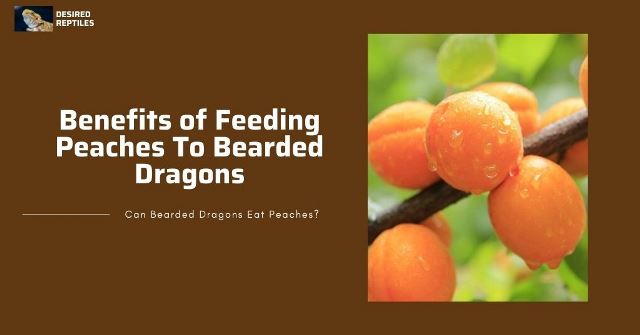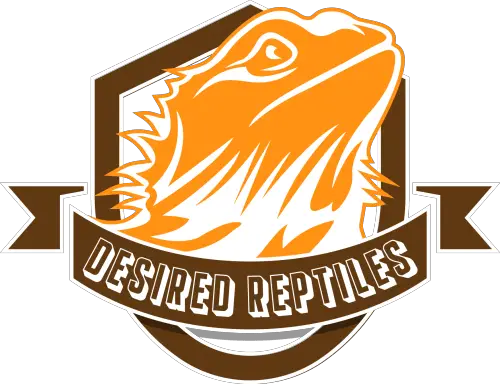Setting up my bearded dragon’s diet was quite stressful at first. I went through a gazillion pieces of conflicting information on which items are safe or harmful to feed beardies and found one common fact: fruits are not staple foods for bearded dragons. In fact, some fruits are incredibly harmful to them. In this article, we’ll be evaluating the safety of peaches once and for all!
Peaches are safe treats for beardies in moderation. They are rich in vitamins A, C, E, and calcium, and have low sugar content in comparison to other fruits like bananas and pineapples.
Before feeding your pet peaches, there are factors you must consider to prevent it from falling sick.
Is It Necessary to Feed My Bearded Dragon Peaches?
You may have thought that fruits are vital for your pet’s well-being, but they’re only occasional treats.
It is not necessary to feed your bearded dragon peaches—your pet can certainly live without eating them. However, they can help boost the immune system and improve its health. So, if your bearded dragon likes peaches, given the benefits, the fruit might just be a necessity to its diet after all.

5 Benefits of Feeding Peaches To Bearded Dragons
Peaches are delicious, and with adequate consumption, can be advantageous to your bearded dragon in the following ways:
1. A Stronger Immune System
Peaches are rich in vitamin C, great for improving the functions of antibodies and decreasing oxidative stress. Safely adding peaches to your beardie’s diet can help build resistance to certain diseases from open wounds or gut problems from moving around the terrarium.
2. Peaches Can Help Maintain Eyesight
The vitamin A in peaches can help maintain your dragon’s eyesight, though beardies rarely develop optical problems. Usually, at about 6 years of age, their sensory functions, such as sight, start to decline. This is why it’s important to put your bearded dragon on a rich diet early, to help stabilize its vital organs as it grows older.
3. Peaches Can Aid Shedding
The vitamins A and E in peaches can aid in reinforcing your beardie’s skin elasticity, protecting it from tearing or breaking during the shedding process. These fat-soluble vitamins are absorbed and retained by the body and are not quickly expelled, which means little can go a long way for your pet.
4. Peaches Can Improve Appetite
Bearded dragons prefer fruit to veggies because of their sweetness. By adding peaches to your beardie’s salad, you can entice it to eat more. Additionally, this treat can speed up digestion and metabolism, potentially increasing your beardie’s appetite.
5. Peaches Aid Digestive Health
Peaches are high in fiber, which can improve your bearded dragon’s bowel movement. If your pet‘s poop consistency is too loose or showing signs of constipation, peaches may help to either hydrate or provide fiber to encourage a healthy texture.
The Right Way to Feed Your Bearded Dragon Peaches
There’s an ongoing debate on whether peaches should be fed to beardies with the skin on. Well, I’d say it depends on where the peach is gotten from. Overly processed, fertilizer-doused peaches can be hazardous for your pet. Introducing such chemicals into their diet is dangerous as they cannot properly metabolize or excrete them. If you are not certain how the peaches are grown, I suggest you peel them before feeding them to your beardie. Otherwise, the skin is a good source of fiber for aiding digestion.
How Much Peach is Enough for Your Beardie?
Feed your bearded dragon fruits in moderation to prevent it from getting sick. Take 1 or 2 vertical slices from the peach, resembling segments of an orange, and cut them into smaller pieces. Each piece should fit the space between your dragon’s eyes to avert a choking hazard.
How Often Should I Feed My Beardie Peaches?
Peaches should be fed to bearded dragons twice a month due to the phosphorus-to-calcium ratio. If you’ve read the article on plants bearded dragons can eat, you’ll have a better understanding of the dangers of excessive phosphorus for bearded dragons. The calcium-to-phosphorus ratio in peaches measures 1:3 (Cal: Pho), which can negatively affect bone development. The ideal ratio is 2:1 for proper circulation and absorption of calcium, and excretion of phosphorus from the body.
Caution: Do Not Feed Peaches to Baby Beardies
At 3 to 6 months, bearded dragons are still developing their bone structure and size, and calcium is the key mineral for this development. The last thing you should do is introduce calcium-binding fruits into their diet as this could hinder their growth. But at 8 months, your beardie becomes mature enough to digest the considerable amounts of phosphorus associated with fruits. This is the best time to introduce peaches to its diet.
Introduce Calcium Supplements to the Peachy Dish
Be sure to add calcium powder (view on Amazon) to the salad with peaches to correct the imbalance of the calcium-to-phosphorus ratio. The extra calcium helps to replace the amount bound to the phosphorus in the peaches. As long as you’re only providing the fruit in small amounts paired with the necessary calcium supplements, your pet will remain safe and sound.
Detriments of Feeding Beardies Peaches In Excess
Too many treats can lead to severe illnesses and even death for your bearded dragon. In this case, here are the consequences of feeding your pet peaches in excess:
Diarrhea and Dehydration
Bearded dragons can develop gut problems from eating peaches excessively, just as you would if you ate too many treats. This can cause your pet to fall ill with diarrhea leading to dehydration, which can be equally life-threatening. If your pet is showing visible symptoms of illness from eating peaches, immediately take it to the vet for evaluation and treatment.
To quickly rehydrate your bearded dragon, soak it in shallow water for 15 to 20 minutes to help it reabsorb moisture. However, this is only a temporary solution as your pet may still need medical treatment.
Lethargy
Diarrhea and dehydration can eventually cause your beardie to become lethargic; a state of inactivity, similar to fatigue, that may take days or weeks to fully recover from. It is a general symptom that signifies a problem with your beardie’s health.
If you notice your pet sleeping earlier or longer than usual, eating less, and moving much slower than it is used to, it is probably lethargic. Promptly visit your veterinarian for analysis, especially since the problem could be directly related to its fruity diet.
Vitamin A Toxicity
Vitamin A is toxic to bearded dragons in high amounts. Unlike vitamin C which is easily eliminated, vitamin A is slowly metabolized and takes longer for the organs to expel. Since peaches are saturated with this vitamin, your pet can develop liver damage from consuming excess, which could be fatal if the situation worsens.
Weakened Bone Density
One of the major reasons peaches should not be fed often or in surplus to beardies is their phosphorus content. Phosphorus readily binds to calcium preventing your bearded dragon from absorbing enough for its bones. It also forms urate plugs (kidney stones) by combining with calcium, which can affect your dragon’s kidneys and digestive tract. If this persists, your dragon may develop a metabolic bone disease or die from impaction.
Are Dehydrated Peaches Safe to Feed Bearded Dragons?
Dehydrated fruit is not good for beardies to consume as it is too dry and sugary for them. Dried peaches will also be much tougher to chew and digest which can lead to impaction. I do not recommend feeding dehydrated peaches to your beardie.
Are Canned Peaches Safe for My Bearded Dragon?
Canned peaches are unhealthy for your pet dragon. They have been doused in preservatives that are unsafe for their digestive system. If you must feed your pet peaches, ensure they are fresh and free of preservatives. Do not provide your bearded dragon with canned fruit—it’s simply not worth it!
Alternative Fruits To Feed Bearded Dragons
Beardie-safe fruits have relatively low oxalate, potassium, phosphorus, and goitrogen content compared to the wide variety of fruits we consume. Aside from peaches, you can feed your dragon the following:
- Prickly pear
- Blueberries
- Blackberries
- Apples
- Mangoes
- Papayas
- Strawberries
- Figs
Remember, fruits should be fed sparingly as they’re not nutritious for bearded dragons. Otherwise, you risk replacing your pet’s nutrient-dense foods with ones of lower nutritional value.
Wrapping It Up
Bearded dragons can eat peaches and they make fairly nutritious treats. Remember that while peaches may be enjoyable for your pet, feeding without caution can harm its well-being. It will relish its treats as long as it does not compromise its health or nutrition. Good luck!
